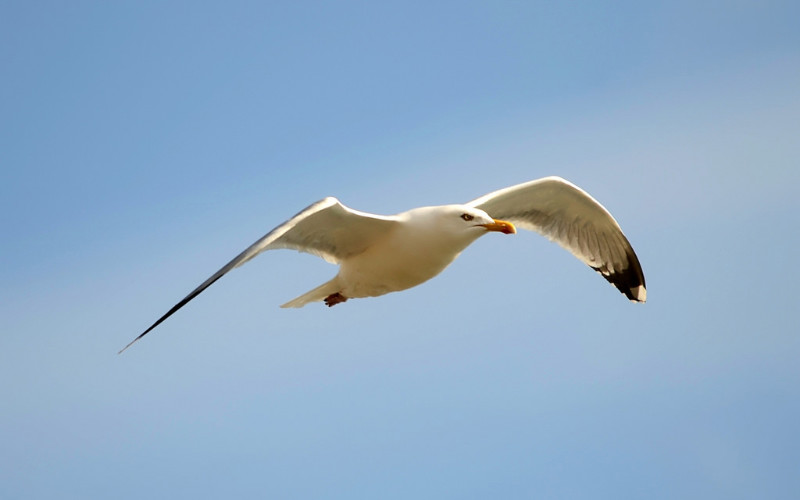Twelve Brief Anecdotes about the King of Birds
Chris Schahfer
I
Ray sometimes wondered if his classmates in college wanted him to become a bird. Once, he had been just another engineering student, poring over diagrams of airplane wings. Whenever he emerged from his dorm, which his classmates called his “nest,” people asked if he was scavenging for food. Indeed, he often came to the cafeteria so late that nothing but the last scraps of dinner were left over. This meant he often ate alone, but he preferred books over people. People never said what they meant. In books, a red shirt was a red shirt, a wing was a wing, a studious young man was a studious young man and not a bizarre loner fascinated with designing airplane wings.
II
Exasperated with scheduling labs and meeting with advisors and the funny looks from his fellow students, Ray dropped out midway through his junior year and took a job as a secretary at his older sister Stephanie’s chiropractic practice. He sat at the front desk for eight hours a day, surrounded by calm blue carpet, fake plants and smooth jazz, helped patients make appointments, answered questions about health insurance. Dropout or not, he still sketched airplane wings in his downtime. He endured patients who talked on the phone while making appointments or peppered him with questions he couldn’t answer. Working with Stephanie made the people he could’ve snapped at tolerable. Ray and Stephanie spent their coffee breaks reminiscing about concerts they’d seen together as teenagers. Neither of them listened to those bands anymore, but they couldn’t resist the warm glow that set in when they talked about them. Ray even tolerated Stephanie’s insistences that he go back to college. While he didn’t plan to go back, he tried to placate her by saying he hadn’t ruled that path out and just needed some time away from it. After his first year of working for her, though, Stephanie issued him an ultimatum. If Ray didn’t reapply for college in three months, she’d fire him. “Look,” she said. “I don’t want to do that, but I want to contribute to your stagnation even less.” Ray put in his two weeks.
III
Aside from his sister, Ray’s only friend was a man named Jack, who looked like a kid despite his constant suitcoat-and-khakis uniform and hair so well-combed it molded to his scalp. Ray attributed his young look to his eyes, big and bright. They lived across the hall in a three-story Detroit apartment and every day shared weed and listened to Jack’s collection of deep house singles from the ’80s, so massive it spanned two bookshelves. The day they met, Ray was on his way out for a walk. He found Jack holding a bottle of whiskey, sad that the friends he planned to share it with couldn’t make it over. A whiskey drinker, Ray asked if he could have some. For all the times Ray was in Jack’s apartment, Jack only entered Ray’s once, brushing aside Ray’s insistence that his home was unpresentable. Ray couldn’t tell if Jack marveled at the airplane wing blueprints hanging on his walls because they impressed or simply confused him, and he was afraid to ask.
IV
Ray ignored the eviction notice, decided to stay in the apartment as long as the cosmos would allow. When they cut the power, he navigated his room with a flashlight. The darkness sent him on paths around mounds of clothes, books that spilled from the bookcase, the long-unused table and chairs. Ray got along fine without power. He would go to the library with his laptop and research airplanes, buying two meals a day with what little money he had left over. He slept there some nights, amid dust and silence. Security guards often caught and ejected him. This pattern continued until the morning two burly men came for his furniture. He threw a wild swing at the one with a pierced ear and missed. The man shoved him aside without the slightest difficulty. Out the door went Ray’s couch, his table, his bed. Ray gathered up enough belongings to fit into a backpack and flew to a nearby motel, a ten-bucks-a-night kind of place. He had to laugh as he settled into bed that night. In a way, he was free.
V
He was awoken when a man with frenzied green eyes, a knotty beard, and a boozy smell broke into his room, waving around a knife and screaming about the money, hand it over you shit or I’ll take it. Ray tried to tell the man he only had one hundred dollars to his name and no way to get more, but the man still charged him, stabbing at the air. He finally slashed Ray across the arm. Ray yanked a lamp out of its socket and brought it down on the bastard’s head. The man’s knees gave out and he collapsed with a pipe organ’s groan. Shards of the ex-lamp poked out of his scalp, a crown for the bleeding man. Ray stood in shock for a moment, wondering if he’d killed him, but the man’s eyelids fluttered. Ray gathered his belongings and ran until he reached an abandoned building with hollow windows, peeled aluminum siding, a gaping mouth of a doorway with a tongue of broken steps. Grass and shrubs grew at the building’s feet. Inside he saw rooms with the remains of their windows scattered over their floors, rooms with upturned bookshelves and rotting furniture for tenants, rooms with walls and ceilings caved in. He pressed up the graffiti-smeared staircase, his own footsteps echoing so loud he thought someone was following him, until he reached the roof, which gave a little under his shoes. He fell asleep on a bed of crushed beer cans and cigarette ash. His last conscious thought: how glad he was to have saved his blueprints.
VI
A swarm of seagulls circled him, cawing and shrieking. He spread his arms to show he meant them no harm, but they landed on him en masse. Expecting them to tear him apart, to take brutal advantage of his peace offering, he took a deep breath. Yet they didn’t attack. Some leapt off him and landed on the roof, others stayed on his arms. He winced as they walked but let them do as they chose. Maybe they saw his arms as wings.
VII
Sometimes Ray thought he’d always be a student. Rather than late nights in his dorm room, hunched over charts and books, he now spent late nights on top of the roof hunched over the same, a flashlight his lone convenience. His wings had to be perfect. Ray bought cages, stuffed them with newspapers and greasy fries, and set them up for the birds. He lured the gulls into these traps via lines of fries. After the birds settled, he removed them from the cages and observed their wings. They often scratched him, and one nipped him so hard on the finger that he dropped it. A man from a nearby rooftop took a picture of their struggle. As Ray shouted at him, the gull flew away. When the birds stayed, Ray took up his notebook and sketched their wings, mindful of the length of feathers, location of joints, proportion of bones. Seagulls weren’t as fast as owls, as huge as eagles, as strange as vultures. Yet if the bird kingdom asked him to be a seagull, he would be a seagull.
VIII
Ray scavenged the dumpsters twice a day for half-hamburgers, discarded drinks, someone’s last piece of pizza. He discovered a set of tent poles that looked sturdy, if weathered. He wondered why anyone would discard such things; these treasures would make such fine bones. He’d already decided the newspapers about him and his rooftop nest could serve as feathers. “King of Birds,” read the articles, and he had no problem with that. Except the articles included his address, which he would’ve wiped off the building if he could’ve. Only a matter of time before he received visitors from the human world. The birds sufficed as company. They who asked no questions, they who requested nothing but food.
IX
Jack found the King on top of his building and invited him down for lunch. The King fought hard to resist the invitation, but his stomach gave off a tremendous growl, so the two headed for a nearby café. Jack hardly let the King get a word in, trotting alongside him with a goofy look on his face and asking what it was like to care for birds. This praise continued all the way to a café, where Jack bought the King lunch. He only broke his breathless schoolboy monologue to ask if he was really making wings, because that was cool and all, but did he really think he could fly? The King, calm as ever, said he could. Jack gave him a nervous smile, told him that was great, headed for the restroom. His wallet fell out of his jacket pocket and the King scooped it up.
X
The King ran, clutching the wallet, footsteps behind him, screams, red and blue lights flashing, pedestrians diving out of his way. Oh, he could’ve taken wing in that moment. He ran so fast and the breeze backed him up plenty and he could’ve spread his arms and flown above the clamor he created. Above the salty smell of French fries and cheap Chinese food that would in the future give him cause to land, the graffiti-stained buildings with boards in the place of windows. Yes, he would fly not just through but above the dead-end alley. The wall in front of him would be something he could clear with a flap of his wings, the police and their dogs mere smears on the city’s topography. The leap from the ground to the fire escape would require no effort, not the overture to a mad scramble up a fifty-foot ladder but a sunward flight limited only by the strength in his wings. Imagine this long-necked man. So tall and so thin he may as well have been stretched putty. Forearms hyperextended. Pain in his left ankle nagging. Chin and nose too sharp. Cheeks hollowing out with every day he spent on the rooftop. Ribs visible through his lone shirt.
Yes, imagine this man in flight.
XI
“I plan to fly away, Stephanie. Out of Detroit, maybe out of Michigan. I’ve made calculations. These could work.”
“You can’t fly with newspaper, Ray. I could get you another job here. It would get you off the streets.”
“I don’t live on the streets. I live on a roof.”
“A roof, the streets, the point is you’re homeless. I get it, Ray. The working world is bullshit, you’re one hundred percent right. I’m impressed you’ve lived on the rooftop for – how long?”
“Three months.”
“Fine in the spring, but what about winter? Remember a couple years ago when it got down to forty below?”
“The birds manage, so can I.”
“Birds fly south. Those wings won’t get you anywhere. Come back to the world, Ray. Your old favorite band’s playing at the Crofoot in a week, if you’d like to see them.”
“Not interested.”
“Honestly? The king of birds shit has to – come back, Ray.”
XII
Stephanie came to the rooftop after weeks of reading nothing about her brother. She told herself to think nothing of it, told herself the King-of-Birds novelty had simply passed, but just the same figured she’d pay him a visit. Yet Ray was gone. The birds, too, had flown. Only the newspaper feathers scattered on the roof proved he’d lived there at all. If anything had happened during his stint on the roof, the papers didn’t report it. So she decided to offer them her own report. As soon as she got home, she sat down at her desk and wrote letters to the biggest papers in Detroit, insisting in each one she saw her brother fly.
Provenence: Submission.

Chris Schahfer received an MFA in creative writing, fiction focus from Roosevelt University in December 2016. His work has appeared in Entropy Magazine, the Dapper Lounge, and Caffeine Presse. He lives in southeast Michigan.
Featured Image: “Seagull In Flight” by Tim Simpson is licensed under CC BY 2.0


No Comments